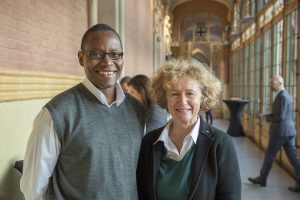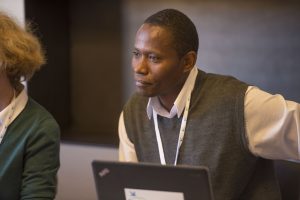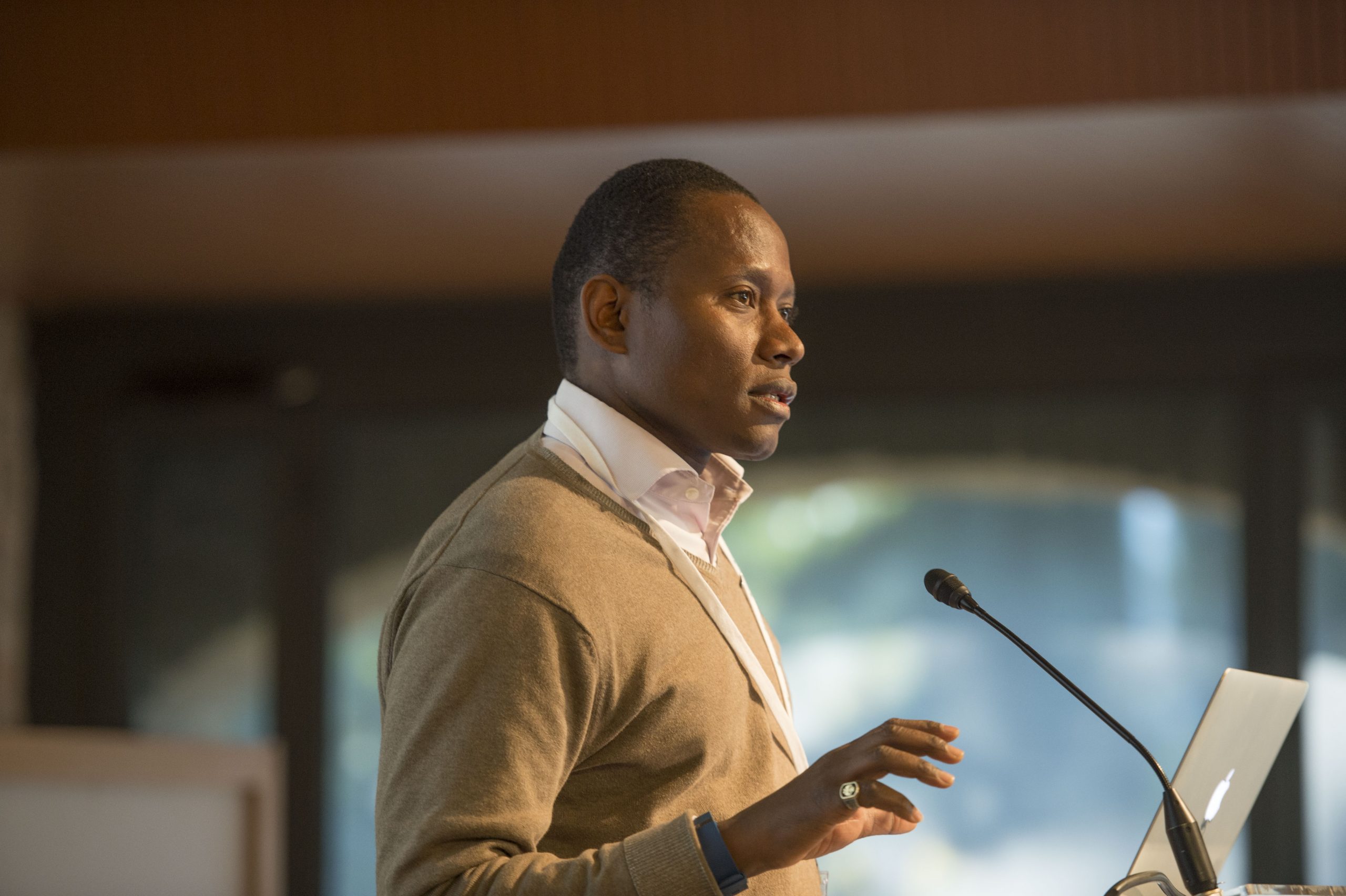Kiragu is Capacity Development Manager who is passionate about helping organizations contribute to nature conservation in more efficient, effective ways. Through his professional and personal relationships with QLF, he has come to admire “how seamless it is for the family members of staff of QLF and the wider network of QLF to take part in conversations about conservation” and hopes to carry that into his own career.
QLF Experiences
QLF Alumni Congress,
Barcelona, Catalonia, Spain 2016
A Practical Questioner ~
Growing up in the Kenyan highlands, Kiragu Mwangi’s passion for nature started with a chance encounter with a Jackson’s chameleon. About ten years old at the time, he was walking his grandfather’s cows to a regular tick treatment when the horned reptile caught his attention. He was fascinated by everything about the animal, from the way it could camouflage with both the rusty red of the ground as well as the deep green of the foliage to the strange way it moved its eyes. He remembers feeling “completely puzzled” and wanting to understand this strange creature and the wonders of nature. This innate desire to pursue the answer to his questions about nature continues to drive his career to this day.
In the early years of his life after his encounter with the chameleon, Kiragu, a recent university graduate with a degree in Natural Resources Management, started wondering how he could become a better manager of natural resources. He asked himself: “What difference are we making for nature conservation?… How many species have we saved? How much economic gain are we making for the local communities that we are working with? How much unemployment have we mitigated?”
At the time a Conservation Programme Officer at NatureKenya, an organization that seeks to promote conservation and connect people with nature, Kiragu started to answer these questions and began

Kiragu Mwangi and Kath Blanchard, co-Facilitators of the Biodiversity Conservation Workshop, QLF Congress, Barcelona, Catalonia, Spain 2016 PHOTOGRAPH COURTESY OF GREIG CRANNA
wondering how to communicate these answers to a broader audience—how to best share and use good science. In search of these answers, he pursued a Master of Science in Applied Ecology and Conservation from the University of East Anglia and soon after began working for BirdLife International.
Currently the Senior Capacity Development Manager at BirdLife International Partnership, Kiragu works to discover “an integrated set of interventions that enhance the capabilities of an organization or individuals to be better at doing or contributing to nature conservation”, what he defines as “capacity building”. Having answered questions about how to become a better program manager himself, he now helps other organizations answer these questions for themselves then communicate the results, in the pursuit of professional development.
BirdLife International is a partnership of 115+ conservation organizations around the world working towards conserving bird habitats and biodiversity, ensuring sustainability, and empowering people. Over the past fourteen years at the organization, Kiragu has worked in almost all of the various technical departments. Although the majority of Kiragu’s extended family thinks all he does is “birdwatching”. His work focuses on empowering people. He is currently working with a few dozen BirdLife Partner organizations around the world to improve their capacity, “focusing on their institutional or organizational development and individual development for the staff”. In the past, he has helped to create the Capacity for Conservation website, which provides organizations with streamlined suggestions of applicable tools to work with when developing “soft skills” such as enhanced money management and communication.

Kiragu at the Biodiversity Conservation Workshop , QLF Congress, Barcelona, Catalonia, Spain, 2016 PHOTOGRAPH COURTESY OF GREIG CRANNA
Going Beyond Professional Development ~ Kiragu first came into contact with QLF in 2013 when Larry Morris and Beth Alling, QLF’s President and Executive Vice President at the time, visited BirdLife International’s Global Office in the U.K. During that trip, Larry and Beth began building a professional partnership between QLF and BirdLife International, discussing potential cooperative projects and avenues of engagement, but they also built a personal friendship with Kiragu. He fondly recounts being hosted by Beth while visiting the QLF office in Ipswich the following year. Since then, Kiragu has continued to build the professional and personal connections between the global QLF and BirdLife International networks, working with QLF Senior Vice President Brent Mitchell on a workshop hosted by the German government on protected areas and discussing a flyways management initiative in America with QLF.
Beyond these professional and personal relationships, what Kiragu admires and finds most unique about QLF is “how seamless it is for the family members of staff of QLF and the wider network of QLF to take part in conversations about conservation”. At the 2016 Alumni Congress, Kiragu was surprised to find that his wife, a nurse by profession, was able to enjoy and “become part of the Congress”. She contributed to conversations about human-nature interactions with knowledge about the benefits nature has during convalescence and how mindfully constructing houses can prevent respiratory diseases”.
“I took away something that I would like to build into BirdLife too: how to bring our families on board. At least, if nothing else, they should get an understanding of what we do,” Kiragu says about the Congress. “It’s about trickling our work into our families.” Based on the experiences Kiragu’s wife had at the Congress, involving the families of conservation leaders may not only be a good way of getting more people to care about conservation issues, but also a practically useful way to garner cross-sectoral thinking. Perhaps this will be the next big question driving Kiragu’s passion for the environment: how to best empower people and their families.






